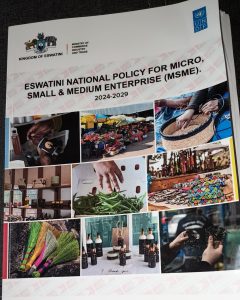By Bahle Gama
The Ministry of Commerce, Industry, and Trade, in collaboration with key stakeholders, is set to spearhead an initiative aimed at facilitating the adoption of standards among Micro, Small, and Medium Enterprises (MSMEs).
This strategic move is part of a broader effort to enhance business competitiveness, boost exports, and ensure sustainable economic growth in Eswatini.
A comprehensive study will be conducted to identify effective methods to ease and prioritise standards development across businesses of varying sizes, particularly within priority sectors.
RELATED: December officially here! MSMEs gear up for booming festive business
The study aims to pinpoint the unique challenges faced by start-ups, MSMEs, and large enterprises in meeting compliance requirements and to recommend tailored solutions that foster an enabling environment for all.
Central to this initiative is the Eswatini National Policy for MSMEs, which was officially launched on Thursday, February 6, 2025, which underscores the critical role of MSMEs in the country’s economic landscape and highlights the importance of providing requisite support to help them thrive.
One of the key objectives is to address the financial and infrastructural barriers that MSMEs face in achieving compliance with industry standards.

By focusing on the adoption of only relevant standards, the Ministry aims to reduce the costs associated with compliance for MSMEs.
This targeted approach is expected to promote higher compliance rates, making it easier for businesses to become export-ready and ultimately increasing the volume of exports from Eswatini.
In addition to the study, a robust publicity campaign will be rolled out through the One-Stop-Shop portal.
According to the policy, this campaign will serve as an educational and information platform, ensuring that entrepreneurs are well-informed about the specific standards applicable to their businesses.
The portal will provide guidance on compliance procedures, resources available to assist in meeting standards, and the benefits of adhering to these regulations.
The Ministry believes that this initiative will not only streamline the standards adoption process but also contribute to the creation of a more dynamic and competitive business environment.
RELATED: EU, ITC expands market access for local MSMEs at EITF 2024
Therefore, by empowering MSMEs with the knowledge and tools needed for compliance, Eswatini can expect to see a significant boost in business growth, job creation, and economic resilience in the coming years.
According to the World Bank, adopting standards is crucial for MSMEs for several reasons including:
- Improved Product and Service Quality:
Standards help ensure that products and services meet consistent quality levels, which enhances customer satisfaction and builds trust. - Increased Market Access:
Compliance with national and international standards makes it easier for MSMEs to enter new markets, including export markets, as many countries require standardized products for import. - Competitive Advantage:
Adopting standards can differentiate MSMEs from competitors, showcasing their commitment to quality, safety, and efficiency. - Operational Efficiency:
Standards often streamline business processes, reduce waste, and improve resource management, leading to cost savings and higher productivity. - Regulatory Compliance:
Meeting industry standards helps MSMEs comply with legal and regulatory requirements, reducing the risk of penalties or business disruptions. - Attracting Investment:
Investors and financial institutions are more likely to support businesses that adhere to recognized standards because they demonstrate reliability and good management practices. - Risk Reduction:
Standards related to health, safety, and environmental management help reduce operational risks, workplace accidents, and liability issues. - Fostering Innovation:
By following best practices outlined in standards, MSMEs can foster a culture of continuous improvement and innovation, keeping them adaptable in changing markets. - Customer Confidence:
Certification and compliance signals to customers that a business is credible, trustworthy, and committed to delivering quality, which strengthens brand reputation. - Global Recognition:
International standards like ISO can elevate an MSME’s credibility globally, opening doors to partnerships, collaborations, and global supply chains.


